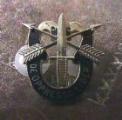The interventions are only foolish because the generals are not allowed to win. Can't remember anywhere where the US forces were defeated.
I said the capability is needed because it is going to be used again and again. You disagree. Your disagreement is based on the hope that this is not true or that despite when you know the need is coming that you should not prepare accordingly?I don't agree on either count. "It is going to be used" is awfully positive and while you may be correct, I would hope -- as I said above, -- we get a bit smarter. There are other, better ways to handle such situations.
The capability doesn't have to built, it has to available which is not the same thing. Adjustments to training, some underway should be adequate IF they are not halted.
Politicians get smarter? Individually yes, they are like coyotes but rather than smarter they get more cunning. The problem is that just when a president starts to be in a position to learn from his screw-ups a new one is elected and he brings along a whole entourage of smart guys who have all the answers. When they had a good few thousand soldiers killed and/or maimed they move on and the cycle repeats itself. Its the US electorate that needs to get smart.
Then you use the balance of the active and reserve forces (all 2.5m of them - remember I said select and train 0.5m (half active, half reserve) to train for irregular wars).We've been in several wars that weren't expected. They didn't all come in irregular form, think Korea and Kuwait...
Come on Ken we live in the ear of the spin doctor. No problem for them to sell change on the basis that with the 21st Century have come new challenges which the military must adapt to. My fear would be that after 30 years there is no one left who remembers how it should be done.We have had a skill deterioration, no question. That is entirely the fault of the training establishment who took decent training programs and tossed them to adopt the atrocious Task, Condition and Standard process, probably so someone could say he brought great change on his watch. We have -- too slowly -- learned that was indeed a mistake and the Army is now groping for a way to fix their problem without admitting they used a flawed process for 30 years. That's the bad news -- the good news is that some units transcend that norm and can and in fact do those things, though there are not enough of them.
Congress again? Remind me who the enemy is again?Maybe, maybe not. Probably not. The tour length is a Congressional issue...
As I said (above) the politicians rotate so there is always a new crop of guys with big egos who know everything.No it isn't. Even dumb politicians eventually learn a little, even dumb American politicians whose egos do not allow the reading of history -- the Army needs to point that out (acknowledging that dumb Generals are another story...).
You were correct with your knowledge of how things work in the US, I was wrong in thinking that because the boys off that carrier could have wrapped it all up over a weekend that would be the preferred option.As I told you long before it started-- and he isn't surrounded by military advisors. By law, he only has one -- the Chairman of the Joint Chiefs. He talks to others on occasion but my impression is he talks and they listen...
I constantly wonder what qualifications are needed for commander in chief. Hitler thought that because he was head of state he somehow inherited the powers of a master military strategist - and see where that got him. The same bloated ego seems to be the problem with US Presidents. I sympathise.
Well it seems the US general staff is full of "yes sir, yes sir, three bags fill sir" types. What happened to the great US warriors who would have replied on Libya as follows: "Mr President we can wrap it up over a weekend but we would be grateful if you would allow us a week so the boys can have some additional live practice while we have the opportunity. Oh yes, and while we are in the area you don't perhaps have any subsidiary targets you would like us to deal with as well? "Same rank. There's some slight merit in what you say but it's far from totally accurate. It's also far more complex than moral courage -- the degree of military subordination to civilian authority in the US is hard for many from other nations to fathom. It has a very pernicious effect...
Don't complicate it Ken, play to your strengths. All you have to really worry about is what you have control over. Don't concern yourself with the token gesture forces from nations who are just going through the motions.I can agree with the sentiment and all it conveys but must point out that nowadays those Battalions come from different units, frequently from different nations and small wars are only fought by all those Battalions if their higher headquarters and / or nation allow them to fight and do not otherwise intrude too heavily...
What, Perfesser, is your solution to that little rub?
But remember:
* If the government you are supporting is corrupt or illegitimate or both,
* If the local government's troops are crap or non-existent,
* If your commander's hands and those of his troops are tied by political limitations and RoE,
* If your military deployments lack continuity at all levels,
* If the war is seriously unpopular at home,
... then you have no chance of success!









 )
)




Bookmarks